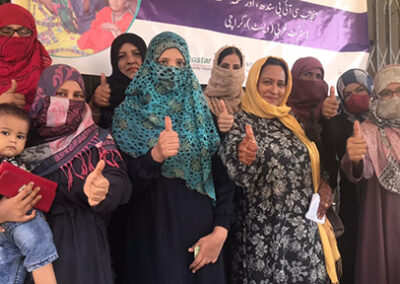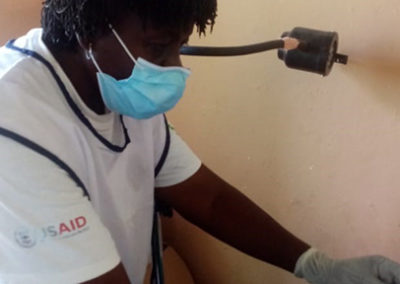TCI Global Toolkit: Service Delivery
Skilled Providers- Home
- Help and Support
- Close
- Toolkits
- Global Toolkit
- AYSRH Toolkit
- Hub Toolkits
- Core High-Impact Practices
- Gender Essentials Mini Course
- Close
- Resource Collection
- Community of Practice
- Coaching
- Log In/Register
- My Profile
- English
What Is It?
 Providers well-trained in family planning who are compassionate, knowledgeable, skilled, motivated and confident. When your program’s demand generation activities prompt women and men to seek family planning services, well-trained providers must be prepared and available meet clients’ needs. Positive provider-client interactions can have a profound effect on uptake of voluntary family planning in a community and help ensure clients leave with their chosen family planning method.
Providers well-trained in family planning who are compassionate, knowledgeable, skilled, motivated and confident. When your program’s demand generation activities prompt women and men to seek family planning services, well-trained providers must be prepared and available meet clients’ needs. Positive provider-client interactions can have a profound effect on uptake of voluntary family planning in a community and help ensure clients leave with their chosen family planning method.
Essentials for Ensuring Skilled Providers
Clinical Guidelines & Standards
Most countries have national guidelines and standards to guide family planning service delivery. These extensive resources (see examples from Kenya and Nigeria) often cover the characteristics and benefits of different contraceptive methods and how they should be delivered to clients to ensure high-quality services.
As such, these guidelines inform core competencies and performance standards for family planning service providers and are integral to program functions such as pre-service education, in-service training, supportive supervision, clinical coaching, self-directed and peer-to-peer learning and training follow-up.
These guidelines are periodically updated, so make sure you are using the latest version.
Check to see if any job aids have been developed and disseminated to providers to help them use the guidelines and standards. If there are performance gaps, assist the local clinical service site to obtain, understand and use the guidelines and standards documents and job aids. You may need to conduct training and/or coaching.
Initial & Refresher Training
Most providers will likely have a basic level of family planning knowledge and skills through previous pre-service and/or in-service training. However, all will need to acquire new knowledge or refresh existing knowledge and improve their skills in order to expand and scale up family planning services in TCI’s urban, underserved geographies.
Depending on the learning needs of participants, this initial or refresher training can be delivered through various learning modalities, ranging from a simple orientation to TCI workshop to a full training workshop and/or coaching to refresh and strengthen their family planning knowledge and skills.
Before conducting any training activities, you should conduct a training assessment to help determine the content and scope of the training required. Training should always follow your country’s national service protocols.
On-the-job training, whereby knowledge and skills are gained at the providers’ place of work, is an alternative option to classroom-based training.
Refresher training should always be considered, whether it is revisiting materials from a prior training or building on previously gained skills. This can take place in-person, through an online learning system (such as TCI University) or even through a mobile application.
Providers should always be given opportunities to improve, further develop and enrich their skills because they can be powerful motivating factors for improving service quality.
Core Competencies and Standards
Regardless of which contraceptive methods providers are authorized to provide, which will vary by country, all family planning service providers should perform the following core competencies according to standards.
Provide Client-Centered Care that Respects Informed Choice and Voluntarism
Skilled service providers need to be competent in providing client-centered care that respects informed choice and voluntarism throughout the entire client-provider interaction, whether it be in a facility, in a community or through mobile-based service. As programs work toward reducing unmet need for family planning, they have a duty, in particular, to protect the human rights of women and men as they develop, implement, monitor and evaluate programs (see related WHO guidance and recommendations as well as a practical conceptual framework to help operationalize these principles in programs). Training and performance standards for client-centered care include:
- Establishing and maintaining rapport with the client
- Approaching all clients, including marginalized and vulnerable populations, in a nonjudgmental and nondiscriminatory manner with respect for individual dignity
- Ensuring privacy and confidentially both verbally and visually
- Showing respect for clients’ choices, as well as their right to consent for or refuse care
- Listening actively to clients and encouraging their questions
- Tailoring the client-provider interaction to the individual client’s needs and preferences
- Addressing the special needs of populations such as adolescents, young adults and men.
(These core competencies for client-centered care have been adapted from multiple sources including the U.S. Department of Health and Human Services and K4Health.)
- Screening for Unmet Need
- Information & Counseling
- Referral
- Infection Prevention
- Contraceptive Method Provision
- Client Follow-up
- Recordkeeping & Reporting
Screening for Unmet Need
All family planning providers working for TCI should be trained to implement provider-initiated family planning. In provider-initiated family planning, the provider actively screens every woman that comes into the facility for unmet need for family planning, regardless of the reason she came to the facility.
Information & Counseling
Balanced Counseling Strategy Plus (BCS+), a counseling strategy tested and refined in several countries, differs from traditional family planning counseling approaches. Rather than relying on the memory of the health care provider, an algorithm takes into account a client’s wishes about when she would like to become pregnant, which helps determine the contraceptive method best suited for the client according her preferences and needs. Rather than providing excessive information about all available methods, the provider then counsels the client on her chosen method. In addition, BCS+:
- Improves effectiveness and efficiency of the family planning consultation
- Simplifies decision making for the client
- Reduces the amount of information that a provider needs to remember
- Is more responsive to the client’s needs and reproductive intentions
- Allows the provider to spend more time listening to clients’ needs, reproductive intentions and contraceptive preferences
In Kenya, the Tupange project used presentation slides on how to apply BCS+ in family planning consultations and counseling cards on BCS+ to train their providers on quality provision of family planning services.
Referral
If providers cannot provide the contraceptive method the client desires, they should have a clear understanding of to whom they should refer the client, how to make the referral, and how to follow-up.
- The facility has stock-outs
- The client selects a method that the provider is not authorized to provide
- The facility does not have the necessary equipment and supplies to provide the method that the client desires
- The provider has not been trained to provide the method the client wants
- Lower-level provider to a higher-level provider within the same facility; for example, a midwife to a physician because only physicians are allowed to insert or remove contraceptive implants
- One facility to another facility; for example, a health post to a hospital for insertion of an intrauterine device (IUD)
- One clinic to another clinic within the same facility; for example, a woman coming to get her child immunized is referred to the family planning clinic
In Nigeria, the NURHI project developed a referral manual that describes exactly how referral procedures should happen at every facility, whether public or private, and at all levels of the health care system (from primary health institutions to tertiary medical centers).
Infection Prevention
Infection prevention is a collective effort made by providers and clients to prevent or minimize risks of transmitting infections. Infection prevention practices are used when caring for all clients, regardless of diagnosis. Universal precautions and key family planning infection prevention practices in the clinic include:
- Washing hands (avoid using a communal towel)
- Wearing gloves
- Decontaminating equipment and devices
- Using new auto-disable syringes and needles for injections
- Using and disposing of needles and sharps properly
- Wearing protective items correctly (for example, using a separate pair of gloves for each client)
- Performing pelvic exams only when necessary
- Promptly cleaning up blood and other bodily fluids, wiping surfaces with chlorine solution
- Using safe disposal systems for waste
- Washing linens
Contraceptive Method Provision
Skilled family planning service providers should be competent to provide the range of contraceptive methods authorized for their respective cadre, level in the service delivery system and/or type of service delivery point . Regardless of position, all authorized service providers should be competent in the following:
- Screening and/or physical assessments to determine if a client is eligible for a specific contraceptive method
- Providing the contraceptive method along with instructions for correct and consistent use, management of any potential side effects and any necessary follow-up
- Using the ‘tell back’ method to check the client’s understanding of correct and consistent use; management of any side effects; and any follow-up necessary for the client to continue using the method (for example, resupply of oral contraceptives, provision of contraceptive injections) or to discontinue the method if desired (such as removal of implants)
There are globally accepted screening checklists for women who want to use the pill, injectables, IUDs or implants.
Family Planning: A Global Handbook for Providers offers the latest guidance on providing contraceptive methods.
Client Follow-up
Skilled family planning providers should develop a plan for follow-up with the client.
The follow-up visit allows the provider to check in with the client after the initial consultation and give advice on any difficulties the client might be experiencing with her chosen method. The client can also ask questions about any side effects she may be experiencing.
Clients can come back to the facility for the follow-up, but you can consider other ways to follow-up with clients to reduce the burden:
- Phone calls
- Text messages
- Using community health workers that are linked with the facility to follow-up with women in their homes
Recordkeeping & Reporting
In addition to clinical and counseling skills, skilled providers should also have basic administrative skills including:
- Recording information about new clients
- Updating and recording information about returning clients
- Assisting with inventory control for contraceptive supplies
- Conducting supportive supervision for lower-level providers, including community health workers
On-the-Job Support
After training, skilled providers need performance support on-the-job in order to transfer their learning to the workplace and continuously perform according to guidelines, standards and client’s expectations of quality. This can be accomplished best through supportive supervision. Supportive supervision encourages open, two-way communication that facilitates problem-solving, continued learning and teamwork, as opposed to traditional, hierarchical models of supervision.
It is an ongoing process that aims to strengthen the relationship between the supervisor and supervisee so that performance can be continuously monitored and problems or other performance issues can be quickly identified and resolved (see box below). National and institutional family planning programs often develop tools such as supervisory checklists, reporting forms and schedules; self-assessment and peer-to-peer checklists; and continued learning/performance improvement action plans to support the supportive supervision process.
Attributes of Supportive Supervision
Supportive supervision should be:
- Timely: providing constructive feedback on performance either routinely and/or as close to the performance event as possible
- Data-driven: using information to set goals and objectives, monitor performance and make decisions
- Quality-focused: monitoring individual and clinic-wide performance against clinical standards and client expectations
- Client-focused: developing and promoting a client-orientation, including internal and external clients
- Results-oriented: focusing on the results of performance, service delivery and program outputs and outcomes
It is also important to maintain a favorable work environment for the provider, which can be supported by management tools such as consultation registers, client forms, and appointment cards. Communication support can also help, such as films on counseling, images, presentations, posters, brochures, and tables for supervision.
TCI APP USERS PLEASE NOTE
You will only receive CERTIFICATES by email – when earning a score above 80% – and will not be able to view or print a certificate PDF from the TCI app.
Test Your Knowledge
Earn a Certificate
Quiz Summary
0 of 3 Questions completed
Questions:
Information
You have already completed the quiz before. Hence you can not start it again.
Quiz is loading…
You must sign in or sign up to start the quiz.
You must first complete the following:
Results
Results
0 of 3 Questions answered correctly
Your time:
Time has elapsed
You have reached 0 of 0 point(s), (0)
Earned Point(s): 0 of 0, (0)
0 Essay(s) Pending (Possible Point(s): 0)
Categories
- Not categorized 0%
- 1
- 2
- 3
- Current
- Review
- Answered
- Correct
- Incorrect
-
Question 1 of 3
1. Question
Competency-based training places less emphasis on learning theoretical knowledge and more emphasis on skills acquisition, competence and mastery for what participants must do after the learning event.
CorrectIncorrect -
Question 2 of 3
2. Question
Of the below, which are considered core competencies that all family planning service providers should perform to ensure that they are providing client-centered care that respects informed choice and volunteerism?
CorrectIncorrect -
Question 3 of 3
3. Question
After training, skilled providers need performance support on-the-job in order to transfer their learning to the workplace and continuously perform according to guidelines, standards and client’s expectations of quality.This can be accomplished best through supportive supervision. Supportive supervision encourages open, two-way communication that facilitates problem-solving, continued learning and teamwork, as opposed to traditional, hierarchical models of supervision.
CorrectIncorrect
Service Delivery Approaches
COVID-19 and Family Planning/Reproductive Health
The Challenge Initiative is working to provide additional resources and tools to help those working in family planning and reproductive health respond to the COVID-19 pandemic. LEARN MORE
External Resources
To Improve Family Planning Knowledge and Skills
(some courses are method-specific)
- Family Planning Teaching Videos, Global Health Media
- Training Resource Package for Family Planning
- The Training Resource Package for Pre-Service Education in Family Planning and Adolescent and Youth Sexual and Reproductive Health, E2A Project
- Global Health eLearning Center Family Planning Methods Courses
- Global Health eLearning Center Family Planning Programming Courses
- Core Competencies in Primary Care for Sexual and Reproductive Health
- Facts for Family Planning
- Family Planning & Reproductive Health In-Service Training Guidance
- Skills Demonstration Video of Localization and Removal of Deeply Placed Contraceptive Implants
To Assess Gender Competency/Sensitivity
- Defining and Advancing Gender-Competent Family Planning Service Providers, HRH2030
- A Tool to Assess the Gender Sensitivity of a Health Facility, Health Policy Project
Guidelines for Informed Choice and Voluntarism
- Ensuring Human Rights in the Provision of Contraceptive Information and Services
- Voluntary, Human Rights-Based Family Planning: A Conceptual Framework
- Voluntary Family Planning Programs that Respect, Protect, and Fulfill Human Rights: A Systematic Review of Tools
- Client-Centered Family Planning Care
Information on Infection Prevention
- Chapter on Infection Protection in Family Planning: A Global Handbook for Providers
Job Aids
- Family Planning: A Global Handbook for Providers
- Medical Eligibility Criteria Wheel for Contraceptive Use
- Screening Checklists for Specific Contraceptive Methods (the pill, injectables, IUDs and implants)
- Checklist: How to be Reasonably Sure a Client Is Not Pregnant
- Job Aid for screening women for unmet need for family planning
Latest Family Planning Technologies and Approaches
- Sayana Press Training Materials









